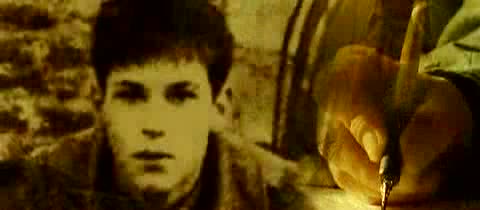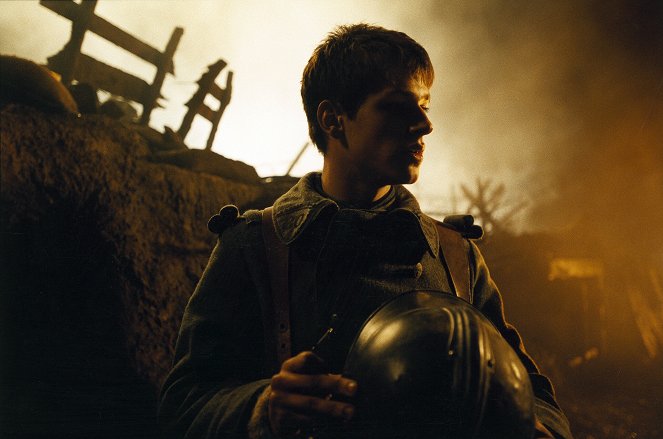Réalisation:
Jean-Pierre JeunetPhotographie:
Bruno DelbonnelMusique:
Angelo BadalamentiActeurs·trices:
Audrey Tautou, Gaspard Ulliel, Dominique Pinon, Chantal Neuwirth, André Dussollier, Ticky Holgado, Marion Cotillard, Dominique Bettenfeld (plus)VOD (3)
Résumés(1)
En 1919, Mathilde a 19 ans. Deux ans plus tôt, son fiancé Manech est parti sur le front de la Somme. Comme des millions d'autres, il est "mort au champ d'honneur". C'est écrit noir sur blanc sur l'avis officiel. Pourtant, Mathilde refuse d'admettre cette évidence. Si Manech était mort, elle le saurait ! Elle se raccroche à son intuition comme au dernier fil ténu qui la relierait encore à son amant. Un ancien sergent a beau lui raconter que Manech est mort sur le no man's land d'une tranchée nommée Bingo Crépuscule, en compagnie de quatre autres condamnés à mort pour mutilation volontaire ; rien n'y fait. Mathilde refuse de lâcher le fil. Elle s'y cramponne avec la foi du charbonnier et se lance dans une véritable contre-enquête. De faux espoirs en incertitudes, elle va démêler peu à peu la vérité sur le sort de Manech et de ses quatre camarades. (texte officiel du distributeur)
(plus)Vidéo (1)
Critiques (8)
Un chaos scénaristique visuellement magnifique. Des filtres de caméra exagérés, une scénographie presque féerique. Un contraste extrême entre la cruauté de la guerre et la tendresse de l'amour. D'un côté, des scènes puissantes et touchantes, de l'autre, une superficialité kitsch et une masturbation vidéo. Quelques passages m'ont cloué au siège (le dirigeable), d'autres m'ont réconforté (l'extinction des allumettes) et un plan m'a emmené dans les nuages (le survol en sens inverse des enfants courant autour du phare). Mais j'ai abandonné le suivi de l'intrigue après une demi-heure. Dans ce genre paisible, le récit trépidant du réalisateur, le montage rapide et la caméra toujours en mouvement créent une atmosphère contradictoire. Sans parler de la révélation tardive des liens avec des scènes initialement ambiguës et inutilement déroutantes. Ce n'est pas censé être un policiers sophistiqué, bon sang ! Malgré tout, j'ai beaucoup aimé cela pour son énergie vitale et son positivisme.
()
The golden filter is removed, the subtitles have ended, and unfortunately, Jean-Pierre Jeunet loses his aura as a visually talented creator, who knows how to handle visual tricks and ideas with sufficient wisdom. He cannot decide what genre he actually prepared for the film. From beginning to end, he constantly jumps between a war drama, a gloomy detective story, and a saccharine romance. However, Jeunet is not Minghella, who could serve another Cold Mountain and instead often gets lost in the first two mentioned genres. A war film as such would probably suit him, but occasional repetition of certain scenes can be incredibly boring, just like during Mathilde's investigation, which even at times stops making sense. Moreover, when he tries to be moving in these two parts, it is occasionally risible. However, what he excels at is romance. As soon as a scene of lovers' memories appears, I almost stopped breathing, just like during her desperate attempts of "I will count to seven and if..." So, I can conclude that I managed to watch A Very Long Engagement without any problems and wished for a happy ending, but I strongly dislike the form in which I received the content. 55%
()
Sebastien Japrisot’s book is quite bad to begin with. It’s a detective story told in terribly clumsy language, which presents a primitive theme in a wannabe sophisticated way of purposeful confusion, and it is therefore not surprising that the film has a similar effect. It remains relatively faithful to the source material, so hats off to those who don’t get lost in the plot chaos. The formal aspects are typical Jeunet without feeling or moderation, as his rampage (the turmoil of trench warfare is as authentic as ever) and picturesqueness (yellow-painted beauty with signs saying "kitsch!" not visible doesn't just catch the eye of the blind) meet again in an uneven whole and battle against each other throughout the runtime. The futility culminates in the moronic casting, which puts Audrey Tautou (76) and Gaspard Ulliel (84) next to each other, with the difference between them being obvious from the poster. This is a heavy misstep that, when repeated again, will in my eyes remove Jeunet from the list of the best original filmmakers.
()
I like the special atmosphere of the rotting decadence of the trenches of the First World War and the visual rendering by J. P. Jeunet is one of the best... excellent camera work, clear management of mass scenes and nice color filters. The battle sequence are just filler for the detective-love mosaic, which is again drawn only by the cute Audrey Tautou, who always uses her big eyes and smile. I was very satisfied with the chosen tone, which is relatively close to the bitter-unserious melodrama from Amelie, but in this film with enhanced undertones of the drama. The overlong engagements offer a rather interesting story, essentially tolerable main character and excellent visual processing, which only confirms the selected abilities of Jeunet's creative vision. I can't say that a melodramatic trip to the depths of war would get to me so deeply, but it slipped softly under over my skin...meaning that it stroked me pleasantly. I like it.
()
Fragmentary in terms of story, perfect in terms of visuals and captivating in terms of music. In places it lacks substance and is rather long-winded, in other places it is indescribably emotionally powerful. Too bad that Audrey is stylized into her Amelie role again. Her acting talent is capable of more than just a grinning mademoiselle. Although the wartime interludes aren’t consistent with the rest of the movie, but they don’t pull down the overall high quality. The result is a crushing victory of form over content. But it’s a quality victory.
()



Annonces